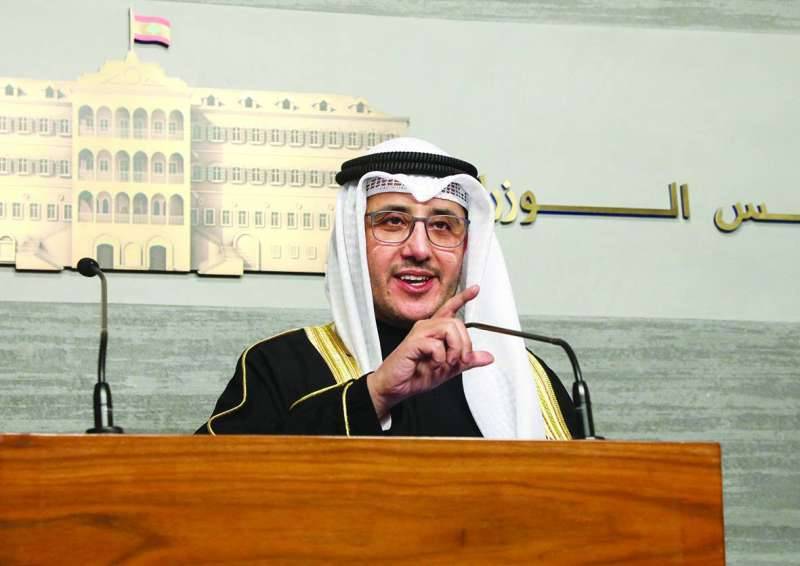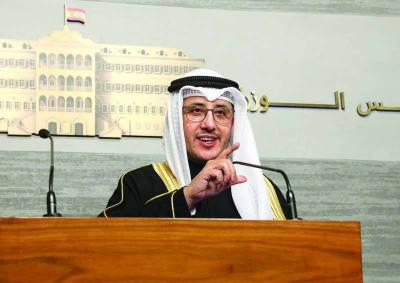In the first high-level visit since the crisis between Lebanon and the Gulf Cooperation Council (GCC) countries at the end of October last year, Foreign Minister and Minister of State for Cabinet Affairs Sheikh Ahmad Al-Nasser arrived in Beirut last night. This is a diplomatic move of significant importance in terms of timing and content, centered around the "Gulf-Lebanese Crisis." Al-Nasser, who was welcomed by Lebanese Foreign Minister Abdullah Bou Habib, began his meetings with a session with Lebanese Prime Minister Najib Mikati. He is expected to meet today with President Michel Aoun and hold discussions with Bou Habib and other officials.
Following a thirty-minute private meeting with Al-Nasser, followed by a broader meeting with officials from both countries, Mikati affirmed that the visit expresses deep brotherly sentiments and a long history of understanding and trust between Lebanon and Kuwait. He thanked Kuwait, its emir, government, and people, for their unwavering support for Lebanon. He stated, "The relations between our two countries have represented a model of brotherhood, and we thank Kuwait for its continuous aid and support for Lebanon at all times and in all circumstances, and for hosting the Lebanese people. The Lebanese will not forget Kuwait's standing alongside them in all difficult times." He added, "We look forward to strengthening cooperation between Lebanon and the GCC countries, and with God's permission, Kuwait will stand by Lebanon, and relations between Lebanon and the Arab brothers will regain their strength."
In a press conference, Al-Nasser explained that the move toward Beirut comes in coordination with the Gulf states and is part of efforts to rebuild trust with Lebanon. He revealed that he delivered proposals and steps as trust-building measures to Mikati and Bou Habib, stating that "it is on Lebanon to study them and determine how to deal with them and move forward." Al-Nasser emphasized that his visit carries three messages: first, to express sympathy and solidarity with the Lebanese people; second, to show a mutual desire to restore Lebanon's prestige and brilliance as an icon in the Arab world, which should be facilitated by not interfering in the internal affairs of Arab and Gulf states and not serving as a platform for verbal or actual aggression against any other state; and third, there is a Kuwaiti-Gulf vision emphasizing the necessity for Lebanon to stand firm, as its strength is a strength for the Arabs.
He stressed the importance of Lebanon fulfilling its commitments and adhering to international legitimacy and Arab League resolutions, indicating that trust-building measures do not happen overnight but require tangible actions, and upon that, matters progress. He clarified that the foundation is non-interference in the internal affairs of Arab and Gulf states, noting that "there are observations regarding the principle of distancing itself (as declared by the Lebanese government), and there is a desire for it to be implemented in both word and action."
Al-Nasser highlighted that "all GCC countries are sympathetic to and in solidarity with the Lebanese people," clarifying that the withdrawal of ambassadors for consultations does not imply severing diplomatic relations and that there are usual procedures with all countries in such cases, which are taken into consideration. He expressed hope for positive responses in the coming days to these measures, pointing out "positive signs" he sensed during his meeting with the Lebanese Prime Minister, and "God willing, it will soon see the light and there will be another momentum and a new start."
He asserted that there is no connection between the situation in Lebanon and its relations with Gulf countries and any other regional or international issues, emphasizing that his visit to Lebanon is to support it, help it overcome its difficulties, and restore trust-building measures without any associated regional or international approaches.




